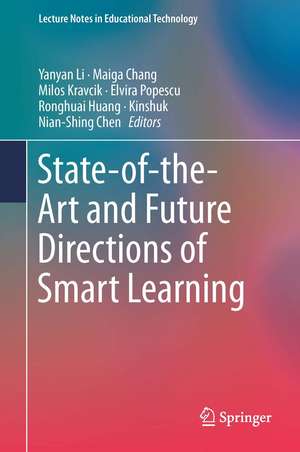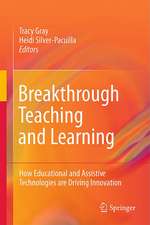State-of-the-Art and Future Directions of Smart Learning: Lecture Notes in Educational Technology
Editat de Yanyan Li, Maiga Chang, Milos Kravcik, Elvira Popescu, Ronghuai Huang, Kinshuk, Nian-Shing Chenen Limba Engleză Hardback – 3 noi 2015
- Pedagogy: learning paradigms, assessment paradigms, social factors, policy
- Technology: emerging technologies, innovative uses of mature technologies, adoption, usability, standards, and emerging/new technological paradigms (open educational resources, cloud computing, etc.)
- Fusion of pedagogy and technology: transformation of curricula, transformation of teaching behavior, transformation of administration, best practices of infusion, piloting of new ideas.
| Toate formatele și edițiile | Preț | Express |
|---|---|---|
| Paperback (1) | 955.25 lei 6-8 săpt. | |
| Springer Nature Singapore – 23 aug 2016 | 955.25 lei 6-8 săpt. | |
| Hardback (1) | 818.22 lei 38-44 zile | |
| Springer Nature Singapore – 3 noi 2015 | 818.22 lei 38-44 zile |
Din seria Lecture Notes in Educational Technology
-
 Preț: 349.91 lei
Preț: 349.91 lei -
 Preț: 359.75 lei
Preț: 359.75 lei -
 Preț: 397.97 lei
Preț: 397.97 lei - 18%
 Preț: 898.43 lei
Preț: 898.43 lei - 20%
 Preț: 1006.05 lei
Preț: 1006.05 lei - 20%
 Preț: 820.58 lei
Preț: 820.58 lei - 15%
 Preț: 647.27 lei
Preț: 647.27 lei - 15%
 Preț: 699.45 lei
Preț: 699.45 lei - 15%
 Preț: 633.31 lei
Preț: 633.31 lei - 18%
 Preț: 945.62 lei
Preț: 945.62 lei - 20%
 Preț: 597.44 lei
Preț: 597.44 lei - 20%
 Preț: 580.52 lei
Preț: 580.52 lei - 15%
 Preț: 702.16 lei
Preț: 702.16 lei - 15%
 Preț: 644.82 lei
Preț: 644.82 lei - 15%
 Preț: 650.69 lei
Preț: 650.69 lei - 24%
 Preț: 804.32 lei
Preț: 804.32 lei - 18%
 Preț: 1003.38 lei
Preț: 1003.38 lei - 15%
 Preț: 647.08 lei
Preț: 647.08 lei - 18%
 Preț: 947.85 lei
Preț: 947.85 lei - 15%
 Preț: 643.48 lei
Preț: 643.48 lei - 18%
 Preț: 999.45 lei
Preț: 999.45 lei - 18%
 Preț: 1102.03 lei
Preț: 1102.03 lei - 18%
 Preț: 891.80 lei
Preț: 891.80 lei - 18%
 Preț: 1002.94 lei
Preț: 1002.94 lei -
 Preț: 393.90 lei
Preț: 393.90 lei - 18%
 Preț: 790.77 lei
Preț: 790.77 lei - 18%
 Preț: 946.41 lei
Preț: 946.41 lei - 18%
 Preț: 784.92 lei
Preț: 784.92 lei - 15%
 Preț: 643.99 lei
Preț: 643.99 lei - 15%
 Preț: 643.00 lei
Preț: 643.00 lei - 15%
 Preț: 644.63 lei
Preț: 644.63 lei - 18%
 Preț: 902.36 lei
Preț: 902.36 lei - 18%
 Preț: 952.72 lei
Preț: 952.72 lei - 18%
 Preț: 942.44 lei
Preț: 942.44 lei -
 Preț: 387.96 lei
Preț: 387.96 lei - 18%
 Preț: 1001.50 lei
Preț: 1001.50 lei - 15%
 Preț: 647.59 lei
Preț: 647.59 lei - 15%
 Preț: 642.83 lei
Preț: 642.83 lei
Preț: 818.22 lei
Preț vechi: 1076.61 lei
-24% Nou
Puncte Express: 1227
Preț estimativ în valută:
156.56€ • 163.91$ • 129.55£
156.56€ • 163.91$ • 129.55£
Carte tipărită la comandă
Livrare economică 01-07 aprilie
Preluare comenzi: 021 569.72.76
Specificații
ISBN-13: 9789812878663
ISBN-10: 9812878661
Pagini: 503
Ilustrații: XVIII, 503 p.
Dimensiuni: 155 x 235 x 35 mm
Ediția:1st ed. 2016
Editura: Springer Nature Singapore
Colecția Springer
Seria Lecture Notes in Educational Technology
Locul publicării:Singapore, Singapore
ISBN-10: 9812878661
Pagini: 503
Ilustrații: XVIII, 503 p.
Dimensiuni: 155 x 235 x 35 mm
Ediția:1st ed. 2016
Editura: Springer Nature Singapore
Colecția Springer
Seria Lecture Notes in Educational Technology
Locul publicării:Singapore, Singapore
Public țintă
ResearchCuprins
Influencing Metacognition in a Traditional Classroom Environment through Learning Analytics.- Predicting Newcomer Integration in Online Knowledge Communities by Automated Dialog Analysis.- SCALE: A Competence Analytics Framework.- VAT-RUBARS: A Visualization and Analytical Tool for a Rule-Based Recommender System to Support Teachers in a Learner-Centered Learning Approach.- Improving Learning Style Identification by Considering Different Weights of Behavior Patterns Using Particle Swarm Optimization.- Designing Mobile Games for Improving Self-esteem in Children with ADHD.- Smart Classroom 2.0 for the Next Generation of Science Learning in Taiwan.- Software-Defined Networking (SDN)-Based Network Services for Smart Learning Environment: The Role of SDN in Smart Competence Learning Analytics platform (SCALE).- Design of Theoretical Model for Smart Learning.- AlecsoApps: Toward Empowering Mobile Applications Development in the Arab World.- Designing Creativity Developing Activities and Studying the Effects on Students in Web-based Learning Environments.- Towards a Learning Ecosystem to Support Flipped Classroom: A Conceptual Framework and Early Results.- Historical Overview of Adaptive Elearning Approaches Focusing on the Underlying Pedagogy.- Using the Hybrid Social Learning Network to Explore Concepts, Practices, Designs and Smart Services for Networked Professional Learning.- Quantitative Analysis of Newcomer Integration in MMORPG Communities.- Designing a Learning Recommender System by Incorporating Resource Association Analysis and Social Interaction Computing.- Investigating Students' Blogging Activity in Project-Based Learning Settings.- How Video Usage Styles Affect Student Engagement? Implications for Video-Based Learning Environments.- Student Engagement Pattern in Wiki and Moodle-based Learning Environments. A Case Study on Romania.- Integrating Motivational Techniques into Learning Management Systems.- A Proposed Model for Creating Authentic Learning Objects for Indigenous Learners.- An Embodied Design with Collective Intelligence for Creating Interactive Video Lectures.- Collaborative Learning through Creative Video Composition on Distributed User Interfaces.- Students’ Learning Environments for Distance International Collaboration.- The Impact of Assigned Roles and Cross-age Peer Tutors on Knowledge Elaboration, Knowledge Convergence, and Group Performance in Synchronous Online Learning Environment.- Towards Non-Intrusive Assessment in Dialogue-based Intelligent Tutoring Systems.- May I Peer-Review Your Web Design Project?.- ICT Architecture for Supporting Elder Employees to Make Conscious Decisions under Time Pressure.- Study on Teacher-Student Interaction in Flipped Classroom Based on Video Annotation Learning Platform.- Design and Implementation of Self-Regulated Learning Achievement: Attracting Students to Perform More Practice with Educational Mobile Apps.- MUSIX: Learning Analytics in Music Teaching.- Metric Based Approach forSelecting the Game Genre to Model Personality.- Towards a Generic E-Assessment Process: Using Cloud Computing.- Public Key Infrastructure for E-Assessment.- Reflection on Design-based Research: Challenges and Future Direction.- Optimal Composition of E-learning Personalization ResourcesMOOCs in Higher Education – Flipped Classroom or a New Smart Learning Model?.- Enhancing Employability through E-learning Communities: from Myth to Reality.- Performance Augmentation through Ubiquitous and Adaptive Learning and Work Environments.- Peer Review from Teachers’ Perspective Comparing Five E-Business Learning Scenarios in Higher Education.- Metrics for Automated Review Classification: What Review Data Show.- What Peer-Review Systems Can Learn from Online Rating Sites.- Peer-Review Support in a Virtual Learning Environment.- Grading Open Ended Questions in an Educational Setting, via Non-Exclusive Peer-Evaluation.- A Wiki-based Approach to Computer Assisted Translation for Collaborative Language Learning.- Integrating Rich Learning Applications in LMS.- Three Uses of the Online Social Programming Training System: On Nature and Purpose of Spreading Algorithmic Problem Solving.- Semi-automatic Annotation of MOOC Forum Posts.- Virtual Social Spaces for Practice and Experience Sharing.- The Open Courses Project at the Eastern Macedonia and Thrace Institute of Technology.- Discovering Interesting Patterns in an E-learning System.- Involving Learners in Content Analysis to Empower a Community of Inquiry.- The Graphical Visualization of Semantically Related Papers and Concepts.- A Tutorial on Machine Learning in Educational Science.- A Smart Environment Supporting the Creation of Juxtaposed Videos for Learning.- An Interactive Video-Based Learning Environment Supporting Learning Analytics: Insights Obtained from Analyzing Learner Activity Data.- Investigating Determinants of Video-Based Learning Acceptance.- Visualization Improvement in Learning Analytics Using Semantic Enrichment.
Textul de pe ultima copertă
This book provides an archival forum for researchers, academics, practitioners and industry professionals interested and/or engaged in reforming teaching and learning methods by transforming today’s learning environments into smart learning environments. It will facilitate opportunities for discussions and constructive dialogue between various stakeholders on the limitations of current learning environments, the need for reform, innovative uses of emerging pedagogical approaches and technologies, and sharing and promoting best practices, which will lead to the evolution, design and implementation of smart learning environments. The focus of the contributions is on the interplay and fusion of pedagogy and technology to create these new environments. The components of this interplay include but are not limited to:
- Pedagogy: learning paradigms, assessment paradigms, social factors, policy
- Technology: emerging technologies, innovative uses of mature technologies, adoption, usability, standards, and emerging/new technological paradigms (open educational resources, cloud computing, etc.)
- Fusion of pedagogy and technology: transformation of curricula, transformation of teaching behavior, transformation of administration, best practices of infusion, piloting of new ideas.
Caracteristici
Presents state-of-the-art research on smart learning from around the world Sets the future course of research and practice for effective futuristic learning Guides research on and practices in future learning environments Includes supplementary material: sn.pub/extras




